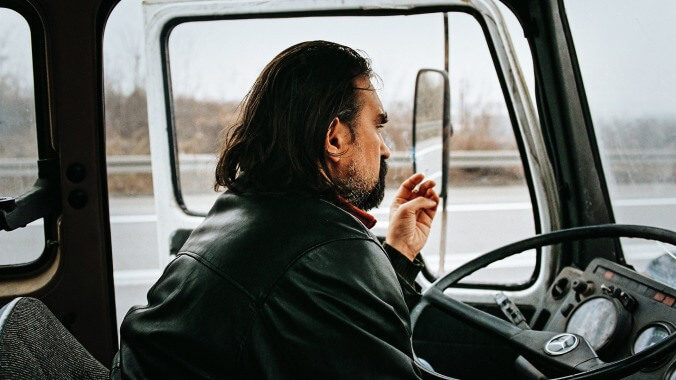The Load puts a tense, terse, historically specific spin on The Wages Of Fear

The Load is a movie in which little is said, but a lot is implied. Set during the Kosovo War, at the height of NATO’s bombing campaign in 1999, it follows a middle-aged truck driver Vlada (Leon Lučev), who’s tasked with transporting unspecified cargo from Kosovo to Belgrade. The instructions are simple: avoid traffic, don’t draw attention, and above all, do not stop driving. He is not told what’s in the back of the truck. And this being his third trip, he does not ask.
The setup immediately recalls Henri-Georges Clouzot’s 1953 masterpiece The Wages Of Fear, in which four men are tasked with moving deadly crates of nitroglycerin through a South American mountain pass. But where the stakes of that masterful thriller are clear from the outset, here they remain, for a time, murky and indistinct—and intentionally so. In making his fiction feature debut, writer-director Ognjen Glavonić keeps information to a minimum; his energies are directed less at crafting meaningful dialogue and more at creating a sense of floating, discombobulating unease. Accordingly, our main character (whose name is only revealed about halfway through the film) is laconic and withdrawn, speaking only when he needs to—as when a bridge on his route is blocked off by an accident and he’s forced to ask for directions.
Identifying the precise subject of The Load might already be giving away too much. Even mentioning the topic of Glavonić’s documentary Depth Two arguably constitutes a spoiler, inasmuch as historical events can really be considered spoilers. For those familiar with this particular portion of Serbian history, however, the contents of Vlada’s truck will come as no surprise. (And anyway, given the film’s conflict-riven context, it’s not exactly difficult to guess.) Suffice it to say that Glavonić is directly engaging with the harrowing legacy of the Kosovo War—though in leaving nonfiction forms behind, he’s also introduced a hefty layer of abstraction. Recalling the structural gamesmanship of Sergei Loznitsa’s My Joy—another film shrouded in the fog of Eastern European history—The Load periodically breaks off from its main route to follow figures completely unrelated to Vlada’s journey. These glancing, atmospheric sequences are all but unmotivated—and are entirely in keeping with Glavonić’s elliptical storytelling. The sole exception is the subplot involving Paja (Pavle Cemerikic), an 18-year-old hitchhiker trying to get to Germany, who rides along with Vlada until he reaches Belgrade and who’s as close as the film gets to a second major character.
As intelligently crafted as the film is, Glavonić’s directorial strategies do end up limiting the film’s observational power. The aforementioned detours are neither long nor specific enough to resonate as much more than suggestive allegory, and Vlada remains something of a cipher throughout—perhaps necessarily so, as the weight of an entire nation’s history is a lot for one person to bear. What The Load succeeds at evoking so superbly, though, is an uncanny sense of physical movement. Comprised mainly of winding digressions through the wintry, rain-soaked Balkan landscape glimpsed through unbroken follow-shots, the film at times suggests nothing so much as an open-world video game. The comparison might seem glib, or even irresponsible, given the context (not to mention the real-life atrocities implied therein), but it’s one that the director himself makes explicit when Vlada describes the ongoing conflict as a “video game war.” Like many filmmakers before him, the 34-year-old Glavonić is interested in reckoning with questions of moral responsibility. What he’s shown in The Load is a situation where survival becomes a matter of playing the game.